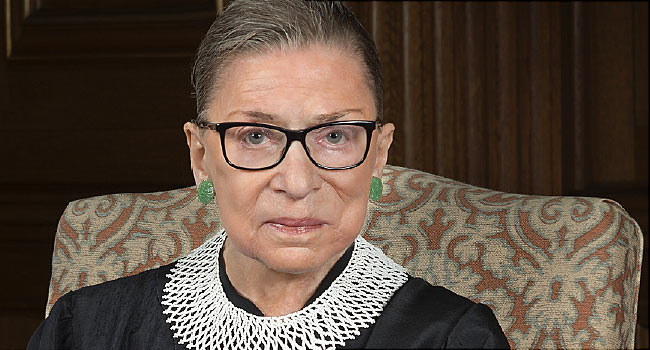
Sept. 18, 2020 — Justice Ruth Bader Ginsburg, a trailblazing jurist and the second woman appointed to the U.S. Supreme Court, died Friday.
She was 87.
The cause of death was metastatic pancreatic cancer, according to a statement from the court.
“Our nation has lost a jurist of historic stature,” Chief Justice John Roberts said in the statement. “We at the Supreme Court have lost a cherished colleague. Today we mourn, but with confidence that future generations will remember Ruth Bader Ginsburg as we knew her — a tireless and resolute champion of justice.”
A private service is planned at Arlington National Cemetery.
Ginsburg, who was the oldest member of the court, was born March 15, 1933, in Brooklyn, NY. She had a sister who died when they were young, and she lost her mother to cancer at 17.
An advocate for the rights of women and minorities, she received her undergraduate degree from Cornell University and earned her law degree from Columbia Law School. Ginsburg is survived by her children, Jane C. Ginsburg and James S. Ginsburg, and several grandchildren. Her husband, Martin D. Ginsburg, died of cancer in 2010.
Ginsburg weathered several major health problems during more than a quarter-century on the high court. The three-time cancer survivor faced her most recent troubles in late 2018, when she had surgery for lung cancer that was discovered after she broke several ribs in a fall in her chambers. In January of 2020, Ginsburg announced that she was cancer free. But in July she said she was undergoing chemotherapy after a lesion was found on her liver.
The justice faced her first bout with cancer in 1999 when she was treated for a colon tumor. A decade later, during a follow-up exam for colorectal cancer, doctors found she had early-stage pancreatic cancer.
In RBG, the 2018 documentary about her life, Ginsburg said that her run-ins with cancer had given her “an enhanced appreciation of the joys of being alive.”
In 2012 and 2018, Ginsburg suffered falls that left her with broken ribs. In 2014, a stent was placed in a major heart artery to remove a blockage.
Although the famously fit judge bounced back from most of her health setbacks, the 2018 pulmonary lobectomy forced her to sit out oral arguments for the first time. Renown for keeping a grueling work schedule, Ginsburg, nominated to the court by President Bill Clinton, hadn’t missed a session since taking her seat on the bench in August 1993.
There may be a few reasons why Ginsburg was able to recover as well as she did from her multiple rounds with cancer.
For instance, Ginsburg is a good example of why adults over 45 should keep up with colon cancer tests — and with follow-up colonoscopies after getting the disease, said Durado Brooks, MD, vice president of cancer control interventions, prevention, and early detection for the American Cancer Society. The colon cancer expert did not treat Ginsburg.
Brooks said there are a variety of cancer screening tests “that have shown to be very effective at decreasing your risk of developing cancer or finding cancer in its early stages,” when it can be treated successfully.
“You don’t have to wait until you have symptoms [of any cancer],” said Brooks.
Ginsburg’s commitment to exercise may have also helped her. Brooks said exercising regularly helps stave off a wide variety of cancers. (The justice’s rigorous routine became so popular that her trainer wrote a book about it.)
Her absence on the bench in early January 2019 made headlines, but it’s fair to say few were surprised to learn she wasn’t taking any time off and was working from home.
“I’ve said many times that I will do this job as long as I can do it full steam,” Ginsburg said in RBG, after she was asked about the calls for her to retire. “And when I can’t, that will be the time I will step down.”
